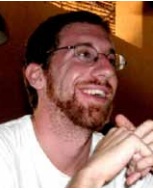
Originally published in The Berkshire Jewish Voice.
“It’s great that you are going to India. But why do you have to travel over there? There is so much to do for your own people here. Or in Israel.”
As I boarded the British Air flight lugging my pack overflowing with antibiotics and sunscreen, this question, posed by a family friend, swam through my mind. I tried to dismiss it. After all, I was going wrapped in a Jewish framework. I was accompanied by ten other recent college graduates chosen by the American Jewish World Service (AJWS) as part of their World Partners Fellowship. Yet, landing in the intensity of swirling heat and cacophony of Northwest India, it was immediately apparent how far I was from the recognizable, from what my friend had termed “your own people.”
At first, I felt this oppressively; but when I moved to my permanent location, an isolated desert city called Bhuj, it seemed that I immediately shed the complexity of my identity. The other three AJWS fellows and I stationed in Bhuj were “the Foreigners” (“ferangis”). We were assumed to know every Westerner that had visited the city previously. In fact, a store refused to sell me an internet stick because an American had stolen one almost a year before.
Sharing my Jewish identity seemed hopeless. The mezuzah around my neck stayed hidden in my shirt, and I settled into the amorphous foreigner status thrust upon me. George Orwell once wrote that colonial Englishmen had to “think out problems in the utter silence” imposed by living in India. In beginning mute and cowed by language and cultural barriers, I too felt I could exist as a Jew in silence, grapple with my religion and its relation to my life in India only in my head. Lakhpat shook me out of this silence.
Lakhpat, a small forgotten town on the desert border between India and Pakistan, was where my main work project was centered. There I helped initiate a development project at the behest of Hunnarshala, the architecture NGO (“non-government organization”) teamed up with AJWS. Traveling frequently to the area and working with a diverse team of architects and local villagers, I slowly moved beyond pleasantries to real friendships. I formed a special bond with Kaladharbhai, a Muslim born into a herder caste who had forsaken the traditional work of his village and instead had become a poet and built a small library for his community. Sitting in this unusual house of study in an area known for its high illiteracy rate and for its connection to fiercely Anti-Western Islamic schooling, we would compare our countries and, later, our faiths.
Kaladharbhai knew of the story of Abraham. After all, the binding of Ishmael is an important story to the Koran. I repeated the story, substituting the Jewish version of Isaac and he was amazed. We compared the Hebrew Aleph-Bet to the Arabic AlifBa and in his Arabic and Sindhi words, I recognized roots I learned at synagogue. It suddenly struck me – here, in the middle of the desert, I could be open about my Judaism and learn from this remarkable friend and colleague.
Orwell had it wrong when he suggested that silence is an imposition thrust upon visitors to lands far from where they grew up. Instead, silence is a choice which at best comes from fear of difference and at its worst, a sense of superiority.
Misunderstandings arise from an inability or an unwillingness to connect on a deep level with people who ostensibly differ in background and values. Kaladharbhai offered an answer to my family friend’s question without knowing it had been asked: Why should a Jew go to a place so far from other Jews, so far from the problems that narrowly affect our own people?
The answer came in my new friend’s curiosity and in mine. We overlapped more than we differed and we now carry with us, forever, a much more complex, honest understanding of each other’s faith, values, and culture.
Jamie van Wagtendonk grew up in Great Barrington. Returning from India, he currently works as a labor organizer for the Service Employees International Union.
AJWS’s work in countries and communities changes over time, responding to the evolving needs of partner organizations and the people they serve. To learn where AJWS is supporting activists and social justice movements today, please see Where We Work.

